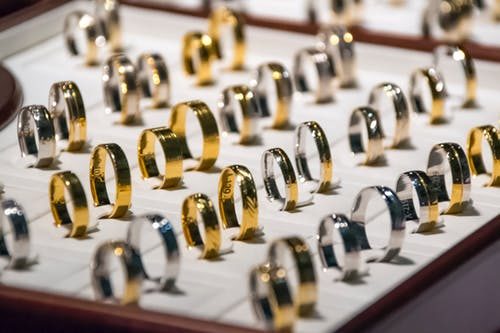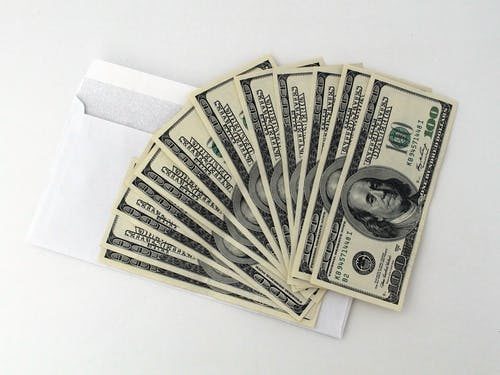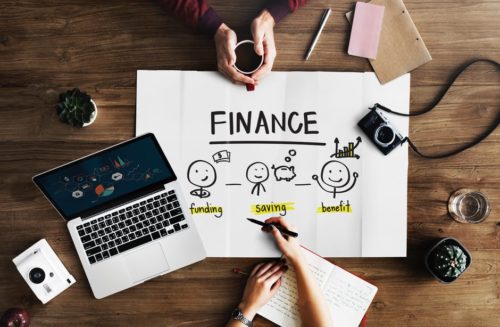In unstable economic times, people are always looking for safe investments for their money. Many will keep their cash in the banks, but some who remember the crash of 2008 or even the Great Depression will be looking for physical investments. Some will turn to property, some will invest in antiques, and some will look into buying precious metals at bullion exchanges.
Now, obviously, investments can be a scary thing because your money can be tied up for months or years, which is why you want to make sure that you know what you’re investing in, the benefits, and what the risks are. That’s why in this article, we’re going to look at one of these investments: buying bullion from the firm Bullion Exchanges.
First, let’s talk about bullion. What is it and why do people choose it as a form of investment?
What is Bullion?

Bullion is defined as gold or silver that is officially recognized as having a purity of 99.5% or above. It comes in the form of bars or ingots. The precious metals are extracted from the earth as ore (a combination of the precious metals and mineralized rock), which is then heated to the melting point of the metal to extract the gold or silver. If the bullion contains one metal, it is known as “parted bullion”. However, if it contains two or more, it is known as “unparted bullion”.
This is a legal currency that is often held in the reserves of central banks to settle international debts or lend to stimulate the economy. It is used by investors to protect their money.
Why Would People Want to Buy or Invest in Bullion?
Ordinary people can buy or invest in bullion in order to secure their money and perhaps make extra money. The idea is that you buy the precious metals when prices are low and then sell when prices rise, just like most stocks and shares. If done right, you can make an incredible profit.
What’s the Difference Between Investing and Buying?

It’s simple really. When you buying bullion, they are yours. You own them. This is often the better option, according to Forbes.
👉 Related reading: How To Make $30K Fast – 9 Realistic Ideas To Try
If you invest in bullion through future contracts or exchange-traded funds (ETFs), you do not own the bullion until it is delivered to you on the contract expiry date. This gives you the chance to change your mind at any point before delivery. You can either sell the contract on or roll over the contract to get a new expiry date. You will only hold the certificates and not the physical bullion, but you can exchange it at a bullion bank for the physical precious metal or its worth in cash.
Is Bullion a Safe Investment?
Generally, yes. The good thing is that the prices tend to rise steadily year on year and don’t often drop dramatically, making it a great long-term investment. Obviously, there can be slight drops so if you are buying and selling the bullion within a few months. However, you can avoid this by watching the precious metals market closely.
Also, the bullion is generally stored in a safe-deposit box at home, at the bank, or at a third-party organization. This means that they are mostly safe from theft, but a decent insurance policy will cover if anything happens else to your investment (i.e. fire damage). If you own the bullion, it is also protected in case the bank or third party holding it goes bankrupt.
Should I go for Gold or Silver?

Always go for gold, if you can. It has a larger liquid market, driven largely by people wanting gold jewelry, and prices are less volatile. However, silver is more affordable and, if you can buy when the market is down, you can make a decent profit. Just make sure to keep an eye on the markets.
Should I Buy Bars or Coins?
Coins are a better investment for most people because they’re easier to trade, especially numismatic coins, which are collectibles. However, if you’re looking to invest a large amount, bars may be better for you.
What is Bullion Exchanges?
Bullion Exchanges is one of the largest retailers of precious metals in the US. It sells gold, silver, platinum, and palladium, catering to first-time buyers and long-term investors. The company says that they source the metals through their 20 years worth of industry contacts, which allow them to pass significant savings onto you, the buyer.
Pros

Free delivery over $75
All orders over $75 are given free, discreet, and fast shipping by Bullion Exchanges. The items are tracked to give you peace of mind.
Authenticity Guarantee
Whatever you’re buying, you want to make sure it’s authentic. That’s why Bullion Exchanges provides all the necessary information on their website, as well as a certificate of authenticity.
Reward Program
Bullion Exchanges has a Rewards Program for repeat customers. If you buy bullion on a regular basis, you’ll get Bullionaire Bucks. (You even get 500 just for signing up.) These can be redeemed against future purchases.
Buys Precious Metals
If you ever need to sell your bullion, you can sell them back to Bullion Exchanges. The company also buys scrap metal, precious metals, and even diamonds and watches for current market value. Plus, they offer free appraisals.

Retail Location
If you prefer to deal with someone face to face, particularly if you’re making a large investment, Bullion Exchanges has a retail location in NYC.
Excellent Rating by Better Business Bureau
The Better Business Bureau is a non-profit aimed at increasing consumer trust in businesses. It has given Bullion Exchanges an A+ rating based on its:
- History of dealing with complaints effectively and quickly.
- Transparent business practices.
- Abidance by Better Business Bureau commitments.
- Abidance by US regulations.
Satisfied customers
On the vast majority of customer review websites, Bullion Exchanges are rated very highly in terms of price, efficiency, and service.

Cons
As with every company, there may be some disadvantages to using Bullion Exchanges, but we want to be clear that the ones below have been taken from customer review websites. We have not been able to independently verify the statements. There are no reports of these or other complaints in news sources or by trading standards.
Some of these comments were responded to by Bullion Exchanges with their side of the story (i.e. “Our records show that your order was shipped within the promised time-frame of 1-3 business days of cleared payment.”), but we also cannot independently verify these statements.
Possible Price Fixing
There are some reports on review websites that say Bullion Exchanges canceled orders between payment and shipping if the price had moved and the buyer would have benefited.
Others report that they bought an item and then saw that the price had gone down later. However, this is probably down to the changing value of the items on any particular day.
Possible Non-Payment for Sales

Some people have reported that they did not receive credit for items they sold to Bullion Exchanges.
Damage to Items
Some report receiving damaged items or collectible boxes and potentially not receiving the full refund when returning the item.
Selling Items That They Don’t Have
Some people said that the orders they placed with Bullion Exchanges were canceled because the items had gone out of stock. The buyers claimed that the company had been selling stuff they didn’t have.
Bullion Exchanges responded that it was a website error. They said the items had sold out and the totals hadn’t updated before the next buyer completed their order. Some cancellations were also due to Bullion Exchanges being unable to verify the payment information supplied by the buyer.
Should You use Bullion Exchanges?

On the whole, Bullion Exchanges is a reputable company with decades of experience. It appears fair to customers in terms of price, quality, and service. The majority of complaints appear to have decent explanations.
Our advice is to compare prices at other online bullion sellers and check at the US Bullion Exchange website before buying.
Make sure to use a credit card, rather than a debit card, to make the initial purchase for added security. The reason being that your credit card company will protect you in case of the item going missing or being damaged if you can’t get a reasonable response from the company that you choose.
What Other Options Exist for Bullion Trade?

Gold Bullion Exchange
This company offers you the chance to buy gold and silver bullion, gold and silver bars, platinum and palladium coins and bars, antique gold and silver coins, silver boxes, proof coins, and world coins.
They have a decade of experience and industry knowledge to help you add items to your collection or build an investment package. They say they offer the lowest prices available, fast and free shipping, and stress-free returns should you change your mind.
It is a member of the Industry Council on Tangible Assets and the American Numismatic Association, which help protect investors, and has an A- rating with the Better Business Bureau.
Kitco Metals Incorporated
Kitco Metals Incorporated, which has an office in New York, is one of the largest precious metals retailers in the world. They sell gold, silver, platinum, palladium, and rhodium in coins and bars, but they also offer signature products (like silver bear statues) and pool accounts, so that you can buy shares in precious metals. (This is great if you can’t afford to invest on your own and cuts out shipping, storage, and brokerage costs.) They also buy scrap precious metals.
They have many favorable customer reviews on sites like Trust Pilot, but financial experts warn that it does not sell rare coins (This might not be a problem for you.) and has a lack of online support. However, the Better Business Bureau gave it an A+ rating.

BullionVault
This company, with a vault in New York, sells gold, silver, or platinum in bars. Thanks to their large size, they claim to have relatively low storage costs (including insurance!) compared with other bullion companies. And their reach is massive. Their 65,000 active clients own about $2 billion in bullion – roughly 37 tons of gold and 500 tons of silver. That’s larger than the reserves of most of the world’s central banks.
BullionVault has an Excellent rating on Trustpilot, however, it has not been accredited or rated by the Better Business Bureau in the 14 years that BullionVault has been operating. However, it also has no complaints on the Bureau’s website.
👉 Related reading: 8 Realistic Ways To Make $20,000 Fast
APMEX
This Oklahoma-based precious metals dealer sells gold, silver, platinum, and palladium in coins, bars, trinkets (like a statue of an astronaut), or even bullets. Specifically, silver bullets that aren't meant to be fired from any weapon. (They can presumably be used in case of a werewolf attack, though.)
APMEX has a range of commemorative items, including coins that mark the Civil War, celebrate the anniversaries of charities, and feature cute animals like pandas and kangaroos. They also sell antique coins, as well as US Mint bullion products featuring American Eagles, Royal Candian Mint products featuring Maple Leafs, and South African Krugerrands.
APMEX has a professional sales team, plenty of payment options, and an A+ rating from the Better Business Bureau. However, financial experts note that the American Precious Metals Exchange – the company’s legal name – has received complaints about second-rate coins, problems with deliveries, and poor customer service.
What Other Investment Opportunities are Available?

If you’ve decided that investing in or buying bullion is not for you, then there are a number of other ways for you to invest your money. We’ll discuss the pros and cons of several options here.
Property
Pro
- Almost always improves in value in the long term.
- Can make extra money renting the property out.
- Less volatile than shares.
- Physical investment.
- Repairs to property and interest on the mortgage may be tax-deductible (Ask an accountant!).
Con
- Can decrease rapidly if the market collapses, like in 2008.
- Can be hard for many investors to get enough capital upfront and manage monthly mortgage repayments on the investment property as well as their residential property.
- Rental income may not cover all of the mortgage, repairs, property tax, etc.
- Not always quick to sell if you need money fast.
- There are often high exit costs involved.
- Will still have to cover related costs even if you have the property empty for a time between tenants.
Bank Accounts

Pro
- Generally pays between 2% and 8% over a year if in a specified savings account.
- Your money – up to $250,000 per account – is insured by the Federal Deposit Insurance Corporation (FDIC) or the National Credit Union Share Insurance Fund (NCUSIF).
- The funds are liquid, meaning you can get to them quickly. This is even true for IRA accounts, although you might have to pay a penalty.
Con
- Does not pay incredible interest unless you’re willing to jump through a lot of hoops (i.e. minimum monthly deposits, set amount of direct debits, changing account regularly, etc.).
- Unlike many investments, you do not get tax relief on the interest earned.
Stocks and Shares
Pro
- On average, the value of stocks and shares increases over time.
- Mostly gives a higher return than bonds or cash deposits.
- Some protection against inflation. This is because, with inflation, company profits generally increase and thus your stocks and shares increase.
- Some influence over company policy for those who own their shares directly, rather than through a mutual fund or a managed fund.
Con
- The stock market is incredibly volatile and you can easily end up losing your investment.
- Risk of the company going bankrupt.
- Requires knowledge of the companies or hiring an investor.
- High charges for hiring investors.
- Even investors don’t have the best track record.
Wine

Pro
- Sounds like a cool investment.
- Can make plenty of money selling when the make or year is rare.
- Diversifies your portfolio.
Con
- Can’t drink your investment.
- Wine must be kept in a secure, temperature and humidity-controlled environment. (You can get it professionally stored for a fee).
- It’s a high-risk investment because you would need to know a lot about wine.
- If buying wine now, you’ll have to wait a long time before the value increases. Five years is a short-term investment for wine, with ten years or more being desired by wine aficionados.
- The wines that tend to gain the most value as the most expensive at the time of purchase.
An important thing to remember is that whenever you are investing, never spend more than you can afford to lose. While some investments are definitely safer than others, all investments do have a risk. If that means that you cannot afford to invest, then don’t invest. It’s really that simple. We’d love to share with you some magical secret to investing that will ensure you will keep your investment safe and help you earn the big bucks, but we can’t.
We hope that this bullion exchanges review has helped you decide whether bullion exchanges is the right way for you to invest or whether you should invest at all.
Continue reading:

